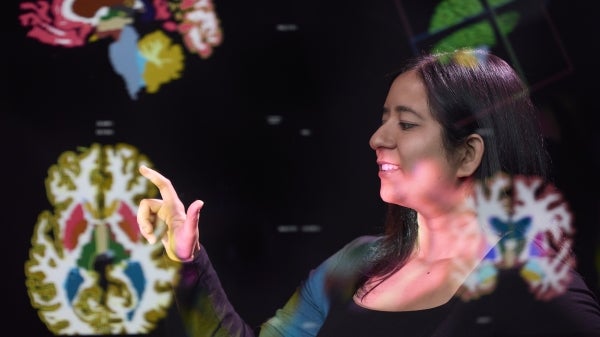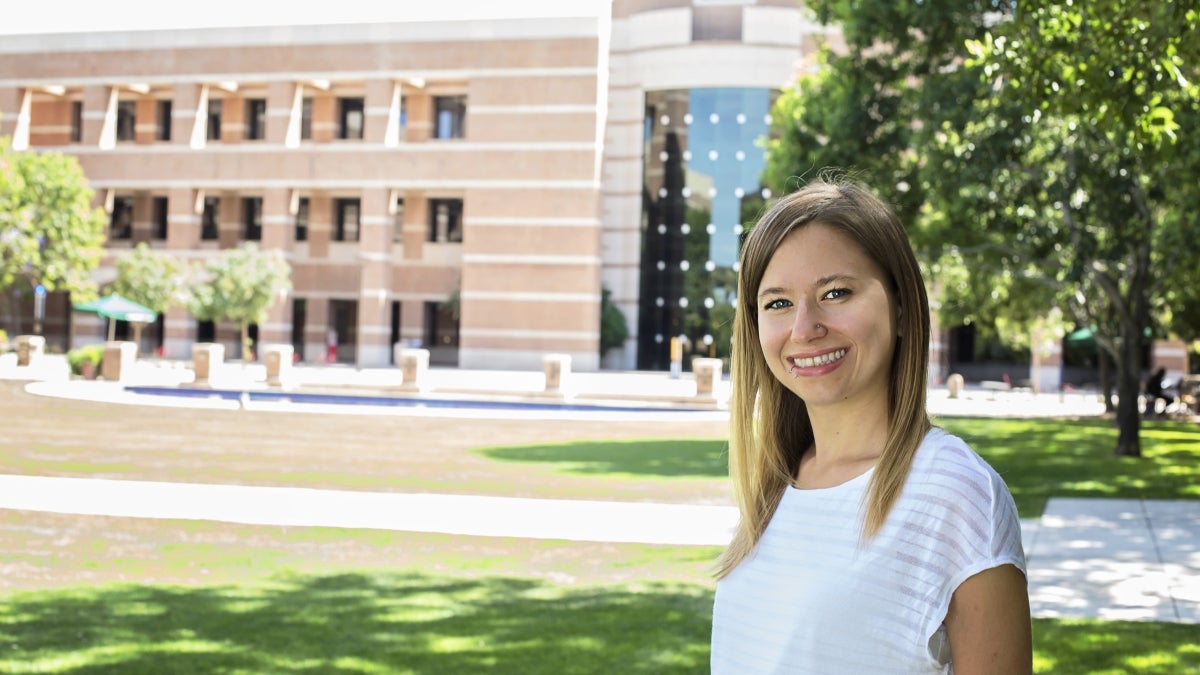Editor's note: This is part of a series of profiles for spring 2016 commencement. See the rest here.
Sarah Malik had always been a good student, but the Chicago native said it wasn’t always easy for her to recognize her abilities. She went through school, she said, feeling like she had lucked into her successes rather than actually deserved them.
ASU has helped Malik realize that she is quite deserving of everything she has achieved. For her hard work, Malik, who is scheduled to graduate with her master of science in psyhology, has been named the New College Outstanding Graduate. She will speak at the Spring 2016 New College Convocation Ceremony.
As an ASU graduate student, Malik has been actively involved in running online and in-lab psychological studies, training research assistants, preparing manuscripts for publication, and presenting her research at conferences. Her main line of research has been a series of studies about perceptions of LGBT sex offenders.
Question: What was your “aha” moment, when you realized you wanted to study the field you majored in?
Answer: I was interested in psychology and chose to major in it on a whim, but when I began my undergrad at the University of Evansville in southern Indiana, I had the opportunity to hear one of the professors talk about the research she was doing in social psychology. It was unlike anything I had ever seen in psychology before, and I was immediately intrigued. She ended up being my undergraduate adviser, and I have continued doing similar research to this day and will continue this after graduation as well.
Q: What’s something you learned while at ASU — in the classroom or otherwise — that surprised you, that changed your perspective?
A: At ASU, I learned that there are so many different types of people with different backgrounds and perspectives that do similar research. Previously, I had mostly known people in my field who had very similar perspectives to mine. But here, I’ve gotten to see many other points of view. Having different perspectives has been very helpful in coming up with research questions or even seeing potential flaws or gaps in studies that I never would have thought of on my own.
Q: Why did you choose ASU?
A: I chose ASU and New College for my graduate program specifically to work with Dr. Jessica Salerno. My undergraduate advisor knew Jessica and introduced us when she discovered that we had similar research interests, so it made sense to come work with Jessica as a grad student since we had already been collaborating previously. I knew that I wanted to move onto a doctoral program after obtaining my master’s degree, and this program is specifically geared toward preparing students to do just that.
Q: What’s the best piece of advice you’d give to those still in school?
A: Take advantage of every opportunity you come across. It’s those extra opportunities that really show what you’re capable of. If I hadn’t gotten involved in research as an undergrad, I would definitely not be where I am now. And if I hadn’t gone to conferences and presented and done what I could outside of class as a master’s student, I might not have gotten as many — or any — PhD interviews. School is entirely what you make of it, and it’s important to push yourself out of your comfort zone.
Q: What is your favorite spot on campus, whether for studying, meeting friends or just thinking about life?
A: My favorite spot on campus is outside of the library [Fletcher Library at the West campus]. In my afternoon slump, I loved to grab some coffee at Starbucks, sit out there and soak up the sunshine. It’s a great place to relax and recharge in between classes and work!
Q: What are your plans after graduation?
A: I was fortunate enough to interview at five different doctoral programs this semester, so I am excited that I will be starting on the path to my PhD this fall! I plan to stay in academia and eventually become a professor. Having been so inspired by faculty who have helped me become who I am today, I hope to continue not only to do research in a field that I love, but to someday pass on this enthusiasm to the next generation of researchers.
Q: If someone gave you $40 million to solve one problem on our planet, what would you tackle?
A: I would first allocate it to making sure everyone had access to nutritious food and water. Whether or not someone has money should not determine if they are able to eat or be adequately nourished. Honestly, I can barely wrap my head around the fact that not everyone has access to these basic necessities right now.
Top photo by Ruth Dempsey
More Science and technology

Podcast explores the future in a rapidly evolving world
What will it mean to be human in the future? Who owns data and who owns us? Can machines think?These are some of the questions pondered on a newly launched podcast titled “Modem Futura.” Co-…

New NIH-funded program will train ASU students for the future of AI-powered medicine
The medical sector is increasingly exploring the use of artificial intelligence, or AI, to make health care more affordable and to improve patient outcomes, but new programs are needed to train…

Cosmic clues: Metal-poor regions unveil potential method for galaxy growth
For decades, astronomers have analyzed data from space and ground telescopes to learn more about galaxies in the universe. Understanding how galaxies behave in metal-poor regions could play a crucial…
